语法复习动词
图片预览

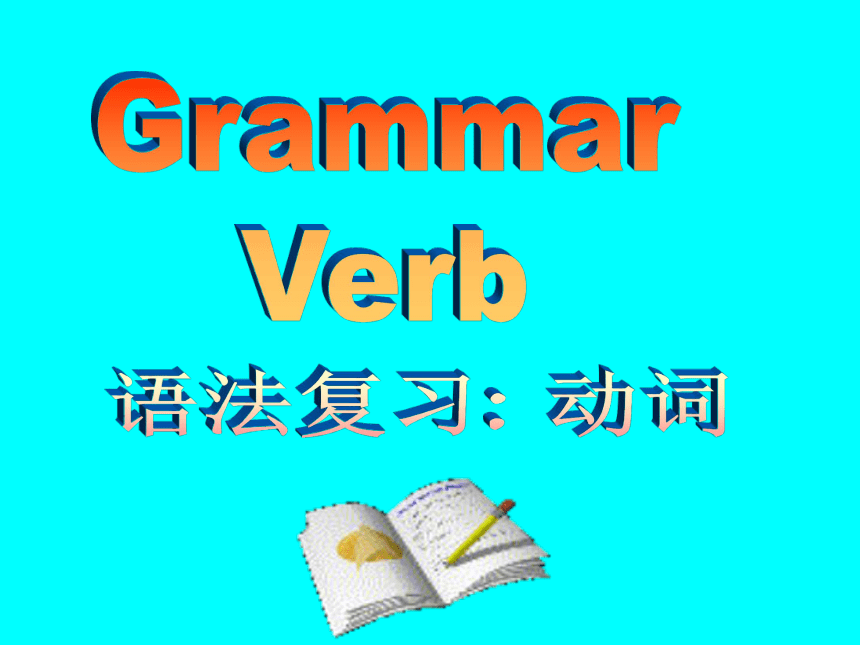
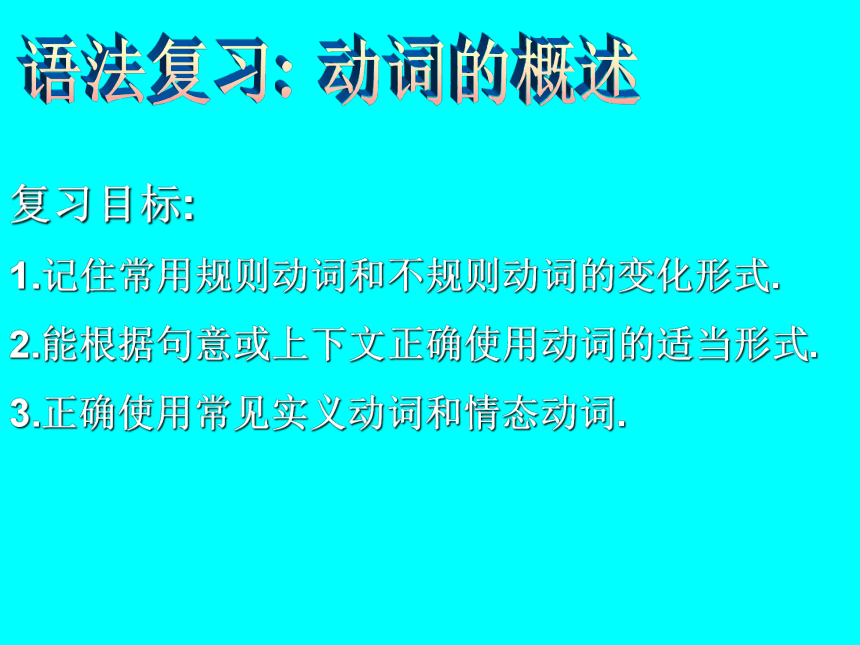
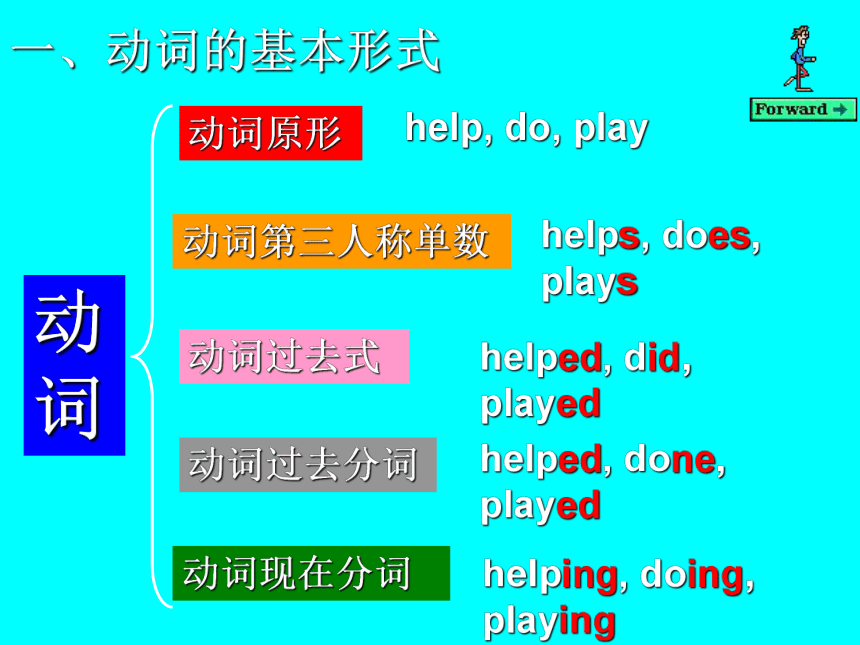
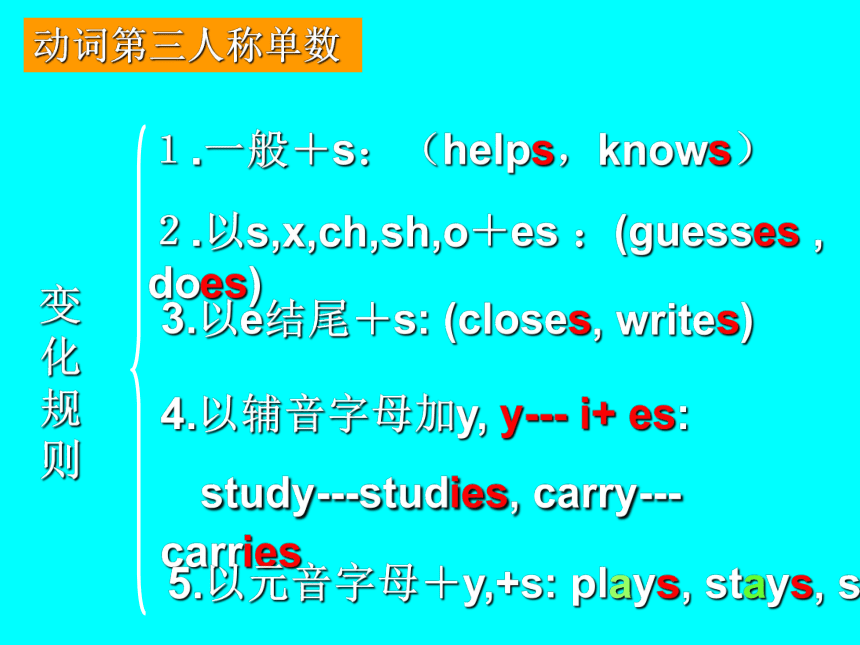
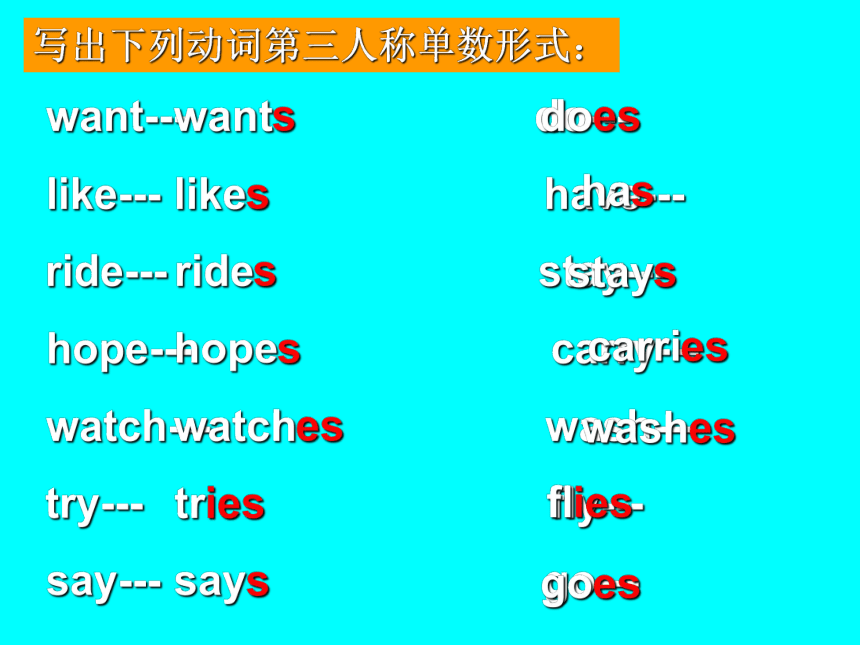
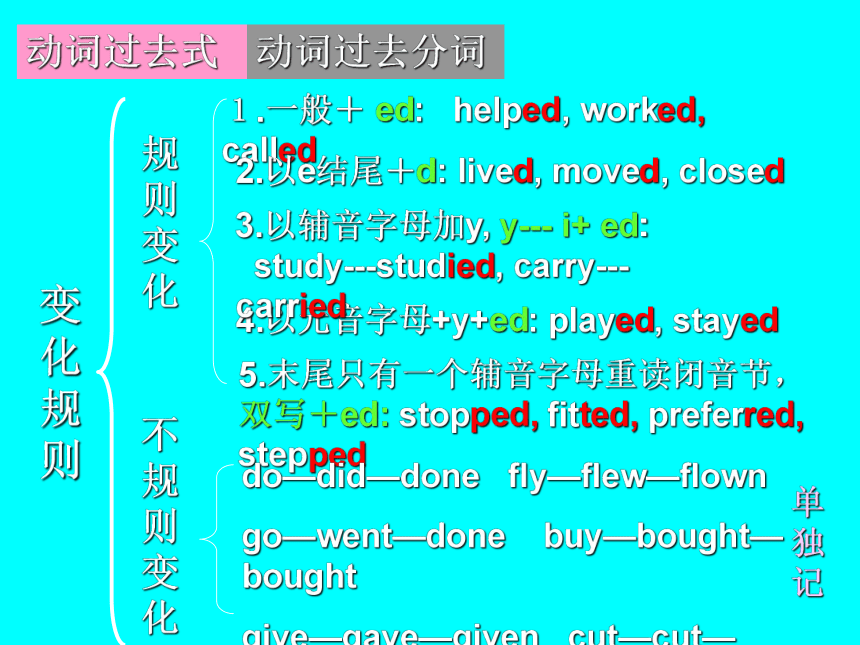
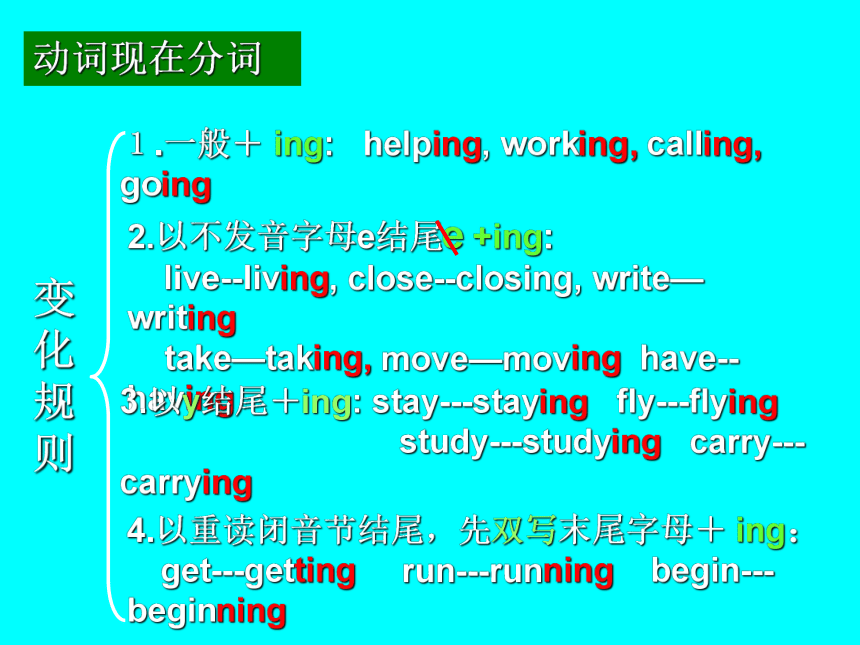
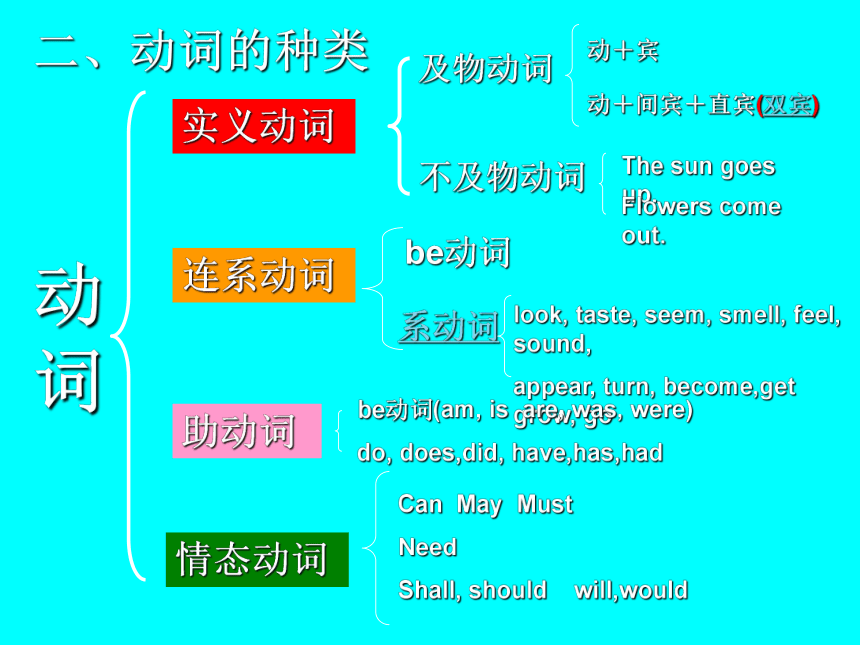
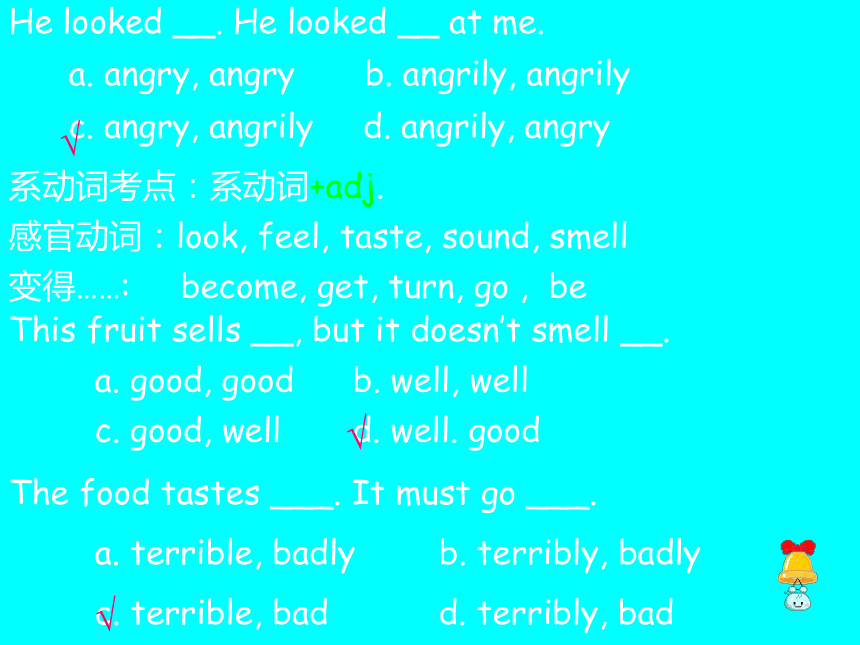
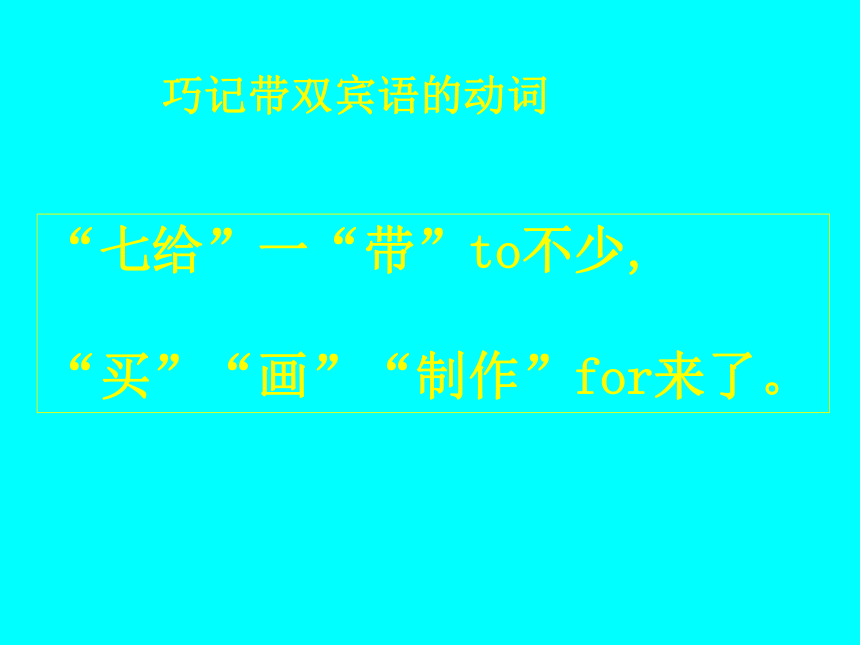
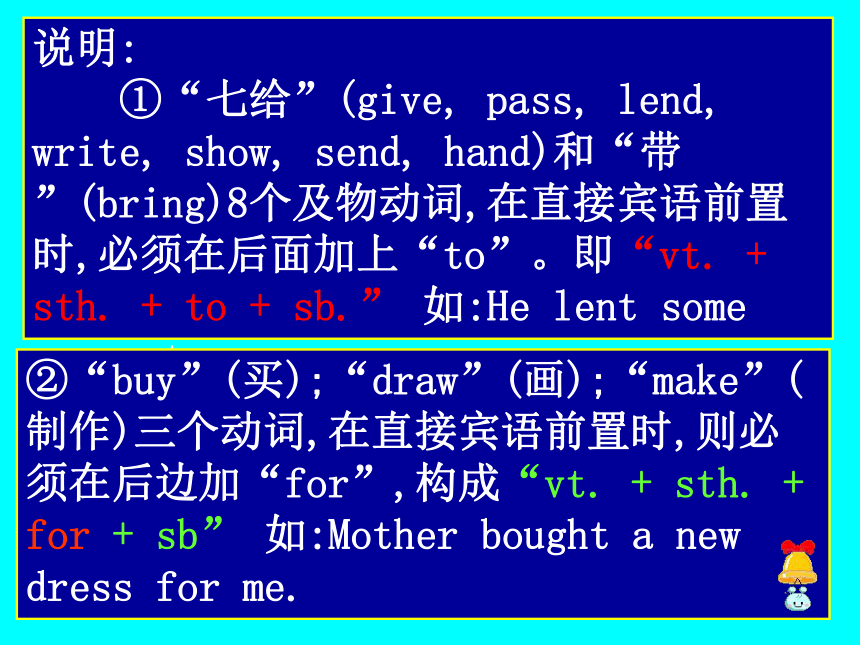
文档简介
课件32张PPT。Gerneral Review(总复习)VERB洪桥逸夫中学——沈筱华(2010年)语法复习: 动词Grammar
Verb复习目标:
1.记住常用规则动词和不规则动词的变化形式.
2.能根据句意或上下文正确使用动词的适当形式.
3.正确使用常见实义动词和情态动词.语法复习: 动词的概述一、动词的基本形式动词动词原形动词第三人称单数动词过去式动词过去分词动词现在分词help, do, playhelps, does, playshelped, did, playedhelped, done, playedhelping, doing, playing动词第三人称单数变化规则1.一般+s:(helps,knows)2.以s,x,ch,sh,o+es :(guesses , does)3.以e结尾+s: (closes, writes)4.以辅音字母加y, y--- i+ es:
study---studies, carry---carries5.以元音字母+y,+s: plays, stays, sayswant--- do---
like--- have---
ride--- stay---
hope--- carry---
watch--- wash---
try--- fly---
say--- go---wants
likes
rides
hopes
watches
tries
saysdoeshasstayscarrieswashesfliesgoes写出下列动词第三人称单数形式:动词过去式动词过去分词变化规则规则变化不规则变化1.一般+ ed: helped, worked, called2.以e结尾+d: lived, moved, closed4.以元音字母+y+ed: played, stayed3.以辅音字母加y, y--- i+ ed:
study---studied, carry---carried5.末尾只有一个辅音字母重读闭音节,
双写+ed: stopped, fitted, preferred, steppeddo—did—done fly—flew—flown
go—went—done buy—bought—bought
give—gave—given cut—cut—cut ……单独记动词现在分词变化规则1.一般+ ing: helping, working, calling, going2.以不发音字母e结尾e +ing:
live--living, close--closing, write—writing
take—taking, move—moving have--having3.以y结尾+ing: stay---staying fly---flying
study---studying carry---carrying4.以重读闭音节结尾,先双写末尾字母+ ing:
get---getting run---running begin---beginning二、动词的种类动词实义动词连系动词助动词情态动词及物动词不及物动词动+宾动+间宾+直宾(双宾)The sun goes up.Flowers come out.be动词系动词look, taste, seem, smell, feel, sound,
appear, turn, become,get grow, gobe动词(am, is are, was, were)
do, does,did, have,has,hadCan May Must
Need
Shall, should will,wouldHe looked __. He looked __ at me.
a. angry, angry b. angrily, angrily
c. angry, angrily d. angrily, angry√系动词考点:系动词+adj.
感官动词:look, feel, taste, sound, smell
变得……: become, get, turn, go , beThis fruit sells __, but it doesn’t smell __.
a. good, good b. well, well
c. good, well d. well. goodThe food tastes ___. It must go ___.
a. terrible, badly b. terribly, badly
c. terrible, bad d. terribly, bad√√“七给”一“带”to不少,
“买”“画”“制作”for来了。巧记带双宾语的动词说明:
??? ①“七给”(give, pass, lend, write, show, send, hand)和“带”(bring)8个及物动词,在直接宾语前置时,必须在后面加上“to”。即“vt. + sth. + to + sb.” 如:He lent some money to me.②“buy”(买);“draw”(画);“make”(制作)三个动词,在直接宾语前置时,则必须在后边加“for”,构成“vt. + sth. + for + sb” 如:Mother bought a new dress for me.情态动词can1.表示具有某种能力“能,会”=be able to
Can you swim?
Can you come this evening?
2.表示可能性“可能”:
I think we can find a better way.
3.表示许可“可以”:You can go now.
4.Can –could: Could you …? 委婉,有礼貌
5.Can I….?
Yes ,you can,
No,you can’t.情态动词may1.用来征求对方意见“允许,可以”:
May I use your bike?---- Certainly.
May I open the window?—Yes,please.
2.表示说话人的猜测“可能,也许”:
If you are not careful,a car may hit you.
3.May I……?
Yes ,you may.
No ,you can’t/ musn’t.情态动词must1.表示说话人的主观意见“必须,应该”:
We must clean all the rooms.
You must obey the rules.
注:与have to 的区别
It’s raining hard.We have to stop.
We must get there before dark.
2.否定形式“mustn’t”意为“不许,禁止”:
You mustn’t play on the road.
3.表示推测“想必,一定”:
It must belong to Carla.
4.Must I…?
have to:客观
must:主观Yes ,you must.
No ,you needn’t./you don’t have to.情态动词need
情态动词: 肯定:need do sth
否定:needn’t do sth
实义动词:肯定:need to do sth
否定:don’t need to do
You needn’t give it back before Ffiday.
We need some help.
You don’t need to write to him.
Does she need to help?情态动词1.Can I….?2.May I….?3.Must I….?Could I….?Yes ,you can.
No ,you can’t.Yes ,you may.
No , you can’t./mustn’t.Yes ,you must.
No ,you needn’t./don’t have to.Let’s…..,shall we?
Let us…..,will you?
Don’t…..,will you?Can-----can’t
Must-----mustn’t
Need-----needn’t– There’s somebody knocking at the door. Who __it be? Is it the postman?
- No. It __ be him. It’s just 7. It’s too early.
a. may, can’t b.will, won’t
c. may, mustn’t d.must, may not情态动词考点:
1、He has to finish the work today, __________?
2、表示推测(must,may,can’t)
-Who’s calling so late?
– It _____ be Jim. He wanted some help from you.
No, it _____ be him. This afternoon he called me.
﹛
√doesn’t hemust/maycan’tmust “肯定”
may “可能”
can’t “不可能”3. (1) -Must I tell him now?
– No, you ________. You can tell him tomorrow.
3.(2) - May I turn up the radio?
- No, you _____________. The baby is sleeping.
4. need do sth. → needn’t do sth
need to do sth→ don’t need to do sth- Could I call you by the first name? - Yes, you __.
a. will b.could c.might d. can
As you don’t look well, you __ come to the meeting today.
a. needn’t to b. needn’t
c. don’t need d. not needneedn’tcan’t/mustn’t√√She can’t __ the difference between the two sentences.
a. tell b. say c. talk d. speak√√考点:易混淆词组:
say/talk/speak/tell
( tell a story, tell a lie, tell the importance of…,
tell the truth, tell the difference )
look/see/watch/read/show
take/spend/pay/cost,
get(to)/ reach/arrive(at,in)My father __ the Party two years ago.
a. joined in b. took part in c. took part d. joined短语动词:get on
turn on
go on
keep on
put onget off
turn off
go off
put off
keep off
take off
set off
show offget up
turn up
go up
put up
wake up
take up
set up
give up
look up
pick up
cheer up
turn down
put down
let..down
look down upon上车
打开继续穿上下车
关掉
闹铃闹响
推迟阻挡脱下
出发炫耀调低
放下使..失望瞧不起...起床调高上升张贴叫醒占据建立放弃查找捡起使振奋get out
carry out
find out
put out
look out
come out
go out
run out of
point outgo over
look over
turn over
think over
come over to
catch up with
come up with
make friends with
shake hands with短语动词:出来
执行
找出熄灭小心绽放.出版出去用完指出温习,复习检查翻转仔细考虑顺便来访赶上想出与…交朋友与…握手1.have / make / let sb do sth
2.tell / ask / want sb (not) to do sth
3.hope/ want/ be ready/pleased/glad / decide
would like/ it’s better /can’t wait
4.practice / like / finish / enjoy / suggest
can’t help / look forward to / be worth
be busy / feel like /give up / put off /go on
have fun / trouble /problem / difficulty (in)
spend……(in)
keep / stop sb from
to do sthdoing sthhear / see / findSb do sthSb doing sthbe heard / seen / made /noticed to do sthstop / remember / foget /go onto do sthdoing sth不同的事相同的事看见某人做了某事看见某人正在做某事I would like __ there but I don’t like _ there at once.
a. walking. to walk b. to walk, walking
c. to walk, to walk d. walking, walking√考点:+to do sth.
want, can’t wait to do, ask/tell sb. to do, decide
+doing sth.
enjoy, worth, finish,practice, mind,
be busy,keep,make a contribution to .feel like, spend,
介词+doing, I think Hannan is worth ____ .
a. to go b. going c. to visit d. visiting√They looked for him everywhere and found him __ under the tree.
a. lies b. lying c. lay d. lain
√考点:see/hear/find/watch sb. do sth.
(看见某人做了某事)
See/hear/find/watch sb. doing sth.
(看见某人正在做某事) I saw him __ the supermarket just now.
a. entered b. entering
c. enter d. to enter√The girl who sold matches was found ___ the next morning.
a. die b. dying c. died d. dead√-Do you remember ___ me somewhere in Hangzhou?
-Yes. I think that’s 2 years ago.
a. see b. seeing c. to see d. saw√ forget/remember to do sth.
forget/remember doing sth.
stop/go on to do sth
stop/go on doing sthThe scientist stopped __ to me though he was busy.
a. talking b. to talk
c. to have talk d. having talk√1. The train had been away for an hour when he __.
a. got b. reached c. arrived d. walked
2. – You must come back every month. - Yes, I __.
a. will b. must c. should d. can
3. My brother __ London since he left school.
a. has been to b. has gone to
c. has been in d. went to
4. When we reached the cinema, the film __ for an hour. a. Had begun b. has begun
c. had been on d. has been on√√√√5. – How __ your family? - Very well. Thank you.
a. is b. are c. was d. were
6. I have a good idea, but __ of them __ to me.
a. both, listens b. either, listen
c. neither, listens d. all, listen
7. Whether he comes or not __ nothing to me.
a. are b. is c. has d. have
8. Mother asked me __ the song. She wanted to listen to the mews report.
a. stop singing b. to stop singing
c. to stop to sing d. stop to sing√√√√9. Would you mind my __ the door?
a. open b. opened c. to open d. opening
10. I prefer swimming __ in summer.
a. to boat b. to boating
c. for boat d. for boating
11. They __ TV when the light __ out.
a. watched, went b. were watching, went
c. watched, was going d. were watching, was going
12. What did you __ about Nanjing?
a. speak b. say c. talk d. tell√√√√13. More than a week ___ already.
a. have passed b. have passed
c. has passed d. has past
14. The right way to cross the road is ____ quickly.
a. walk b. to walk
c. walked d. have walked
15. Mr. Brown has stopped smoking since he ____ on.
a. will operate b. will be operated c. operated d. was operated
√√√
Verb复习目标:
1.记住常用规则动词和不规则动词的变化形式.
2.能根据句意或上下文正确使用动词的适当形式.
3.正确使用常见实义动词和情态动词.语法复习: 动词的概述一、动词的基本形式动词动词原形动词第三人称单数动词过去式动词过去分词动词现在分词help, do, playhelps, does, playshelped, did, playedhelped, done, playedhelping, doing, playing动词第三人称单数变化规则1.一般+s:(helps,knows)2.以s,x,ch,sh,o+es :(guesses , does)3.以e结尾+s: (closes, writes)4.以辅音字母加y, y--- i+ es:
study---studies, carry---carries5.以元音字母+y,+s: plays, stays, sayswant--- do---
like--- have---
ride--- stay---
hope--- carry---
watch--- wash---
try--- fly---
say--- go---wants
likes
rides
hopes
watches
tries
saysdoeshasstayscarrieswashesfliesgoes写出下列动词第三人称单数形式:动词过去式动词过去分词变化规则规则变化不规则变化1.一般+ ed: helped, worked, called2.以e结尾+d: lived, moved, closed4.以元音字母+y+ed: played, stayed3.以辅音字母加y, y--- i+ ed:
study---studied, carry---carried5.末尾只有一个辅音字母重读闭音节,
双写+ed: stopped, fitted, preferred, steppeddo—did—done fly—flew—flown
go—went—done buy—bought—bought
give—gave—given cut—cut—cut ……单独记动词现在分词变化规则1.一般+ ing: helping, working, calling, going2.以不发音字母e结尾e +ing:
live--living, close--closing, write—writing
take—taking, move—moving have--having3.以y结尾+ing: stay---staying fly---flying
study---studying carry---carrying4.以重读闭音节结尾,先双写末尾字母+ ing:
get---getting run---running begin---beginning二、动词的种类动词实义动词连系动词助动词情态动词及物动词不及物动词动+宾动+间宾+直宾(双宾)The sun goes up.Flowers come out.be动词系动词look, taste, seem, smell, feel, sound,
appear, turn, become,get grow, gobe动词(am, is are, was, were)
do, does,did, have,has,hadCan May Must
Need
Shall, should will,wouldHe looked __. He looked __ at me.
a. angry, angry b. angrily, angrily
c. angry, angrily d. angrily, angry√系动词考点:系动词+adj.
感官动词:look, feel, taste, sound, smell
变得……: become, get, turn, go , beThis fruit sells __, but it doesn’t smell __.
a. good, good b. well, well
c. good, well d. well. goodThe food tastes ___. It must go ___.
a. terrible, badly b. terribly, badly
c. terrible, bad d. terribly, bad√√“七给”一“带”to不少,
“买”“画”“制作”for来了。巧记带双宾语的动词说明:
??? ①“七给”(give, pass, lend, write, show, send, hand)和“带”(bring)8个及物动词,在直接宾语前置时,必须在后面加上“to”。即“vt. + sth. + to + sb.” 如:He lent some money to me.②“buy”(买);“draw”(画);“make”(制作)三个动词,在直接宾语前置时,则必须在后边加“for”,构成“vt. + sth. + for + sb” 如:Mother bought a new dress for me.情态动词can1.表示具有某种能力“能,会”=be able to
Can you swim?
Can you come this evening?
2.表示可能性“可能”:
I think we can find a better way.
3.表示许可“可以”:You can go now.
4.Can –could: Could you …? 委婉,有礼貌
5.Can I….?
Yes ,you can,
No,you can’t.情态动词may1.用来征求对方意见“允许,可以”:
May I use your bike?---- Certainly.
May I open the window?—Yes,please.
2.表示说话人的猜测“可能,也许”:
If you are not careful,a car may hit you.
3.May I……?
Yes ,you may.
No ,you can’t/ musn’t.情态动词must1.表示说话人的主观意见“必须,应该”:
We must clean all the rooms.
You must obey the rules.
注:与have to 的区别
It’s raining hard.We have to stop.
We must get there before dark.
2.否定形式“mustn’t”意为“不许,禁止”:
You mustn’t play on the road.
3.表示推测“想必,一定”:
It must belong to Carla.
4.Must I…?
have to:客观
must:主观Yes ,you must.
No ,you needn’t./you don’t have to.情态动词need
情态动词: 肯定:need do sth
否定:needn’t do sth
实义动词:肯定:need to do sth
否定:don’t need to do
You needn’t give it back before Ffiday.
We need some help.
You don’t need to write to him.
Does she need to help?情态动词1.Can I….?2.May I….?3.Must I….?Could I….?Yes ,you can.
No ,you can’t.Yes ,you may.
No , you can’t./mustn’t.Yes ,you must.
No ,you needn’t./don’t have to.Let’s…..,shall we?
Let us…..,will you?
Don’t…..,will you?Can-----can’t
Must-----mustn’t
Need-----needn’t– There’s somebody knocking at the door. Who __it be? Is it the postman?
- No. It __ be him. It’s just 7. It’s too early.
a. may, can’t b.will, won’t
c. may, mustn’t d.must, may not情态动词考点:
1、He has to finish the work today, __________?
2、表示推测(must,may,can’t)
-Who’s calling so late?
– It _____ be Jim. He wanted some help from you.
No, it _____ be him. This afternoon he called me.
﹛
√doesn’t hemust/maycan’tmust “肯定”
may “可能”
can’t “不可能”3. (1) -Must I tell him now?
– No, you ________. You can tell him tomorrow.
3.(2) - May I turn up the radio?
- No, you _____________. The baby is sleeping.
4. need do sth. → needn’t do sth
need to do sth→ don’t need to do sth- Could I call you by the first name? - Yes, you __.
a. will b.could c.might d. can
As you don’t look well, you __ come to the meeting today.
a. needn’t to b. needn’t
c. don’t need d. not needneedn’tcan’t/mustn’t√√She can’t __ the difference between the two sentences.
a. tell b. say c. talk d. speak√√考点:易混淆词组:
say/talk/speak/tell
( tell a story, tell a lie, tell the importance of…,
tell the truth, tell the difference )
look/see/watch/read/show
take/spend/pay/cost,
get(to)/ reach/arrive(at,in)My father __ the Party two years ago.
a. joined in b. took part in c. took part d. joined短语动词:get on
turn on
go on
keep on
put onget off
turn off
go off
put off
keep off
take off
set off
show offget up
turn up
go up
put up
wake up
take up
set up
give up
look up
pick up
cheer up
turn down
put down
let..down
look down upon上车
打开继续穿上下车
关掉
闹铃闹响
推迟阻挡脱下
出发炫耀调低
放下使..失望瞧不起...起床调高上升张贴叫醒占据建立放弃查找捡起使振奋get out
carry out
find out
put out
look out
come out
go out
run out of
point outgo over
look over
turn over
think over
come over to
catch up with
come up with
make friends with
shake hands with短语动词:出来
执行
找出熄灭小心绽放.出版出去用完指出温习,复习检查翻转仔细考虑顺便来访赶上想出与…交朋友与…握手1.have / make / let sb do sth
2.tell / ask / want sb (not) to do sth
3.hope/ want/ be ready/pleased/glad / decide
would like/ it’s better /can’t wait
4.practice / like / finish / enjoy / suggest
can’t help / look forward to / be worth
be busy / feel like /give up / put off /go on
have fun / trouble /problem / difficulty (in)
spend……(in)
keep / stop sb from
to do sthdoing sthhear / see / findSb do sthSb doing sthbe heard / seen / made /noticed to do sthstop / remember / foget /go onto do sthdoing sth不同的事相同的事看见某人做了某事看见某人正在做某事I would like __ there but I don’t like _ there at once.
a. walking. to walk b. to walk, walking
c. to walk, to walk d. walking, walking√考点:+to do sth.
want, can’t wait to do, ask/tell sb. to do, decide
+doing sth.
enjoy, worth, finish,practice, mind,
be busy,keep,make a contribution to .feel like, spend,
介词+doing, I think Hannan is worth ____ .
a. to go b. going c. to visit d. visiting√They looked for him everywhere and found him __ under the tree.
a. lies b. lying c. lay d. lain
√考点:see/hear/find/watch sb. do sth.
(看见某人做了某事)
See/hear/find/watch sb. doing sth.
(看见某人正在做某事) I saw him __ the supermarket just now.
a. entered b. entering
c. enter d. to enter√The girl who sold matches was found ___ the next morning.
a. die b. dying c. died d. dead√-Do you remember ___ me somewhere in Hangzhou?
-Yes. I think that’s 2 years ago.
a. see b. seeing c. to see d. saw√ forget/remember to do sth.
forget/remember doing sth.
stop/go on to do sth
stop/go on doing sthThe scientist stopped __ to me though he was busy.
a. talking b. to talk
c. to have talk d. having talk√1. The train had been away for an hour when he __.
a. got b. reached c. arrived d. walked
2. – You must come back every month. - Yes, I __.
a. will b. must c. should d. can
3. My brother __ London since he left school.
a. has been to b. has gone to
c. has been in d. went to
4. When we reached the cinema, the film __ for an hour. a. Had begun b. has begun
c. had been on d. has been on√√√√5. – How __ your family? - Very well. Thank you.
a. is b. are c. was d. were
6. I have a good idea, but __ of them __ to me.
a. both, listens b. either, listen
c. neither, listens d. all, listen
7. Whether he comes or not __ nothing to me.
a. are b. is c. has d. have
8. Mother asked me __ the song. She wanted to listen to the mews report.
a. stop singing b. to stop singing
c. to stop to sing d. stop to sing√√√√9. Would you mind my __ the door?
a. open b. opened c. to open d. opening
10. I prefer swimming __ in summer.
a. to boat b. to boating
c. for boat d. for boating
11. They __ TV when the light __ out.
a. watched, went b. were watching, went
c. watched, was going d. were watching, was going
12. What did you __ about Nanjing?
a. speak b. say c. talk d. tell√√√√13. More than a week ___ already.
a. have passed b. have passed
c. has passed d. has past
14. The right way to cross the road is ____ quickly.
a. walk b. to walk
c. walked d. have walked
15. Mr. Brown has stopped smoking since he ____ on.
a. will operate b. will be operated c. operated d. was operated
√√√
同课章节目录
- 词法
- 名词
- 动词和动词短语
- 动词语态
- 动词时态
- 助动词和情态动词
- 非谓语动词
- 冠词
- 代词
- 数词和量词
- 形容词副词及其比较等级
- 介词和介词短语
- 连词和感叹词
- 构词法
- 相似、相近词比较
- 句法
- 陈述句
- 一般疑问句和否定疑问句
- 特殊疑问句及选择疑问句
- 反意疑问句
- 存在句(There be句型)
- 宾语从句
- 定语从句
- 状语从句
- 主谓一致问题
- 简单句
- 并列句
- 复合句
- 主谓一致
- 主、表语从句
- 名词性从句
- 直接引语和间接引语
- 虚拟语气
- 感叹句
- 强调句
- 倒装句
- 祈使句
- 句子的成分
- 句子的分类
- 题型专区
- 单项选择部分
- 易错题
- 完形填空
- 阅读理解
- 词汇练习
- 听说训练
- 句型转换
- 补全对话
- 短文改错
- 翻译
- 书面表达
- 任务型阅读
- 语法填空
- 其他资料
